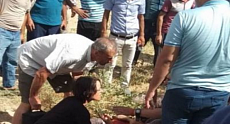Kazakhstan appealed to the US with proposal to increase visa validity for citizens of the Republic of Kazakhstan from 5 to 10 years
Almaty. January 20. Silkroadnews - Kazakhstan appealed to the US with the proposal increase visa validity for citizens of the Republic of Kazakhstan from 5 to 10 years, the press service of the Ministry of Foreign Affairs informs.
“In 2013 the US government had decided to increase maximum visa validity for the citizens of Kazakhstan from 1 year to 5 years. MFA of RK has appealed to the American colleagues with a proposal to consider the possibility of increasing the validity term up to 10 years”, Foreign Ministry said in a statement on Tuesday.
As for information on putting Kazakhstan on the list of “highly dangerous” countries as submitted to the US Congress, the Foreign Ministry reported that it is an outdated information.
“As for the information reported today by some of Kazakhstani mass media we inform it is based on an outdated information on the bill developed by the US Senator Rand Paul in November 2015. The bill did include the annex with the list of several dozen countries of the world and was submitted to the upper chamber of the US Congress, yet, was rejected by US lawmakers overwhelmingly 89 votes against 10”, the Foreign Ministry reported.
As it was previously informed by the newspaper “Izvestia”, The US Congress introduced a bill that puts Russia on a list of “highly dangerous countries” from where the terrorists can enter the territory of the States. “Security Act” is put forward by the Republican Senator Rand Paul.
In addition to Russia the list of “highly dangerous countries”, according to the project included Afghanistan, Algeria, Bahrain, Bangladesh, Egypt, Eritrea, Indonesia, Iran, Iraq, Jordan, Kazakhstan, Kuwait, Kyrgyzstan, Lebanon, Libya, Mali, Morocco, Nigeria, North Korea, Oman, Pakistan, Qatar, Saudi Arabia, Somalia, Sudan, Syria, Tajikistan, Tunisia, Turkey, United Arab Emirates, Uzbekistan, Yemen and the Palestinian Territories.


